Stephen Pentz on a poem that shows how revolutionary Wordsworth’s poetry was in its day, even though it seems very traditional to us now…
In August and September of 1803, Wordsworth, his sister Dorothy, and Samuel Taylor Coleridge went on a tour of Scotland. Dorothy Wordsworth’s journal of the tour contains this entry for September 11 (Coleridge had set off on his own by this point):
The sun had been set for some time, when, being within a quarter of a mile of the ferryman’s hut, our path having led us close to the shore of the calm lake, we met two neatly dressed women, without hats, who had probably been taking their Sunday evening’s walk. One of them said to us in a friendly, soft tone of voice, “What! you are stepping westward?” I cannot describe how affecting this simple expression was in that remote place, with the western sky in front, yet glowing with the departed sun. William wrote the following poem long after, in remembrance of his feelings and mine.
William Knight (editor), Journals of Dorothy Wordsworth, Volume II (1897), page 105.
Stepping Westward
“What, you are stepping westward?” — “Yea.”
— ‘Twould be a wildish destiny,
If we, who thus together roam
In a strange Land, and far from home,
Were in this place the guests of Chance:
Yet who would stop, or fear to advance,
Though home or shelter he had none,
With such a sky to lead him on?
The dewy ground was dark and cold;
Behind, all gloomy to behold;
And stepping westward seemed to be
A kind of heavenly destiny:
I liked the greeting; ’twas a sound
Of something without place or bound;
And seemed to give me spiritual right
To travel through that region bright.
The voice was soft, and she who spake
Was walking by her native lake:
The salutation had to me
The very sound of courtesy:
Its power was felt; and while my eye
Was fixed upon the glowing Sky,
The echo of the voice enwrought
A human sweetness with the thought
Of travelling through the world that lay
Before me in my endless way.
William Wordsworth, Poems, in Two Volumes (1807) (italics in original).
Wordsworth prefaced the poem with an introduction that parallels Dorothy Wordsworth’s journal entry:
While my Fellow-traveller and I were walking by the side of Loch Ketterine, one fine evening after sunset, in our road to a Hut where, in the course of our Tour, we had been hospitably entertained some weeks before, we met, in one of the loneliest parts of that solitary region, two well-dressed Women, one of whom said to us, by way of greeting, “What, you are stepping westward?”
Ibid, Volume II, page 14.
A poem like “Stepping Westward” reminds us how revolutionary Wordsworth’s poetry was in its day, even though it seems very traditional to us now. The poem is almost conversational, which is what Wordsworth was after: “the real language of men,” as he described it in his 1802 Preface to Lyrical Ballads. The “poetic diction” that he hoped to “avoid” is nearly absent.
Apart from a few archaisms, I can hear Edward Thomas in “Stepping Westward.” For example: “In a strange Land, and far from home.” Or: “And stepping westward seemed to be/A kind of heavenly destiny.” And this: “I liked the greeting; ’twas a sound/Of something without place or bound.” (Robert Frost can be heard in these lines as well, which is no surprise.) The Thomas echo may also be traceable to Thomas’s penchant for writing poems about encountering friendly strangers while walking in the countryside.
I think that Thomas’s poetry in many ways brings Wordsworth’s best intentions into being. The last six lines sound like pure Thomas:
. . . and while my eye
Was fixed upon the glowing Sky,
The echo of the voice enwrought
A human sweetness with the thought
Of travelling through the world that lay
Before me in my endless way.

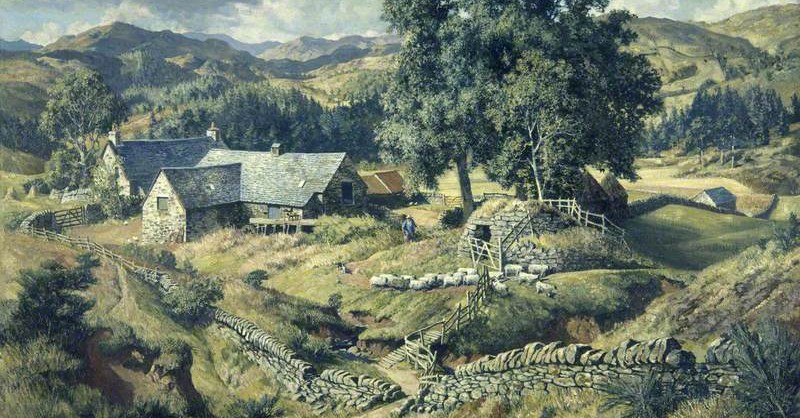
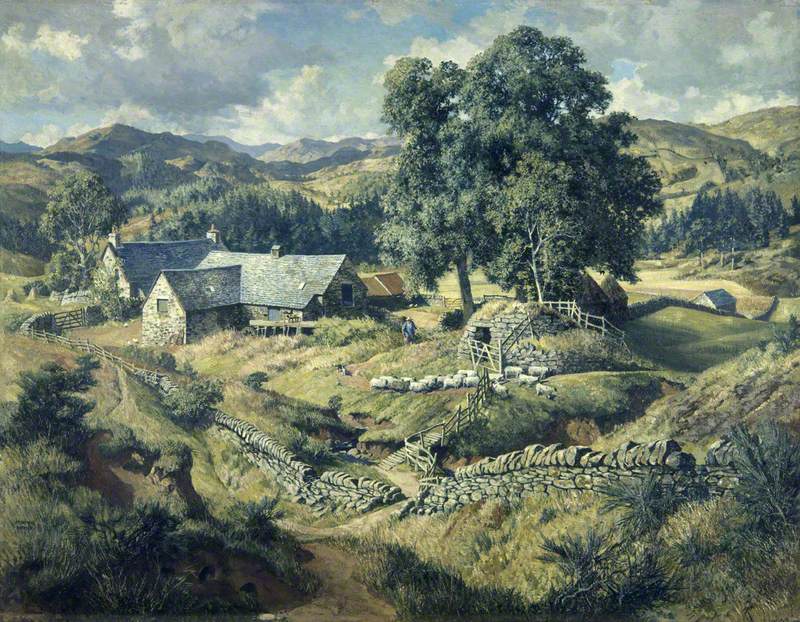
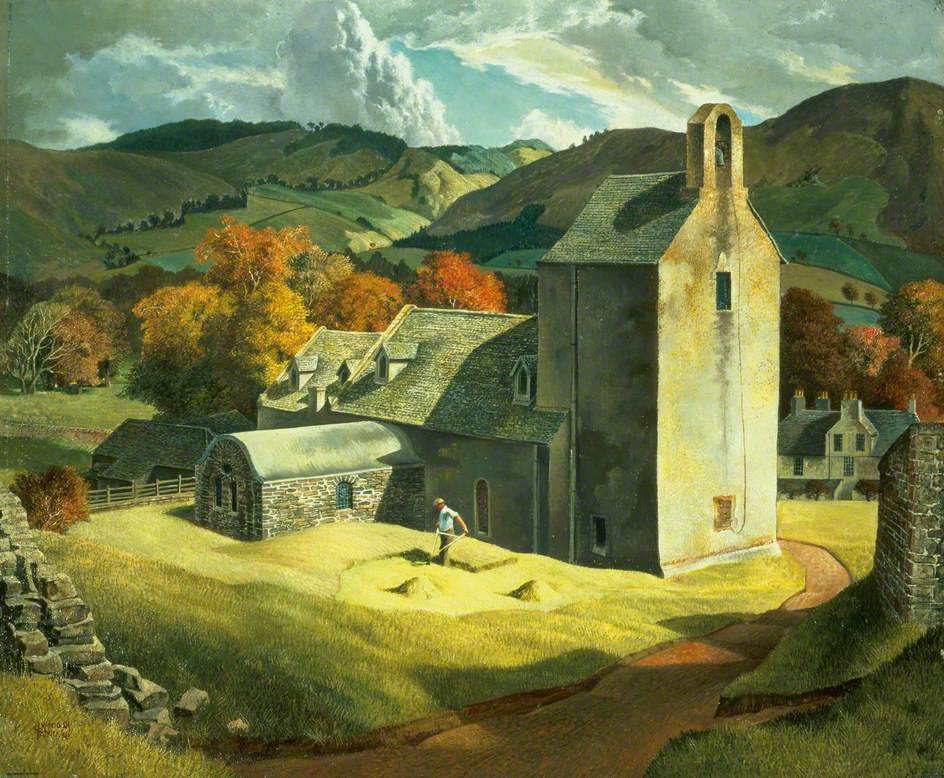
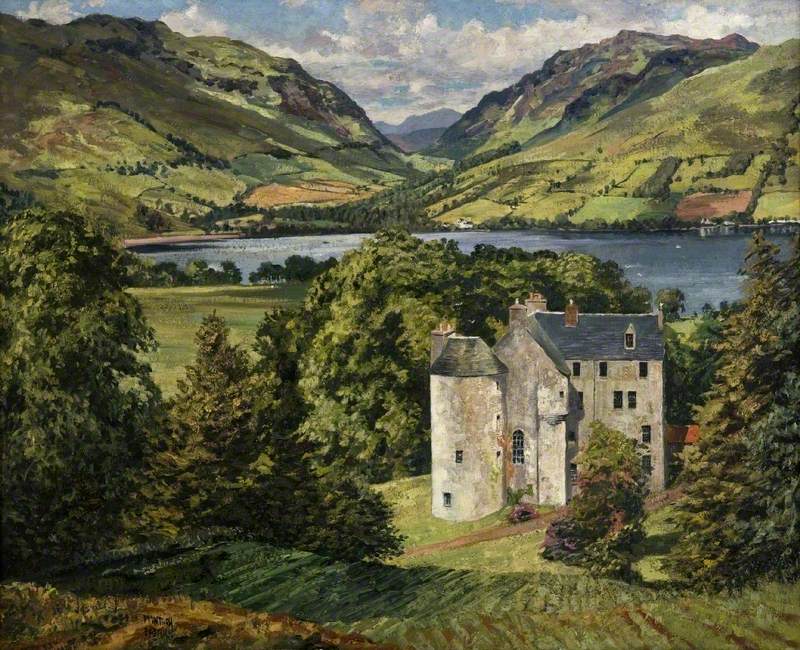
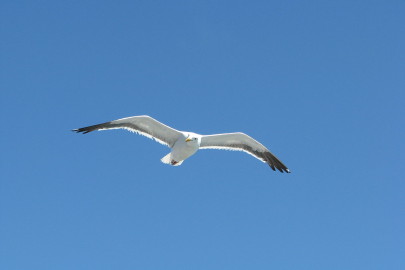
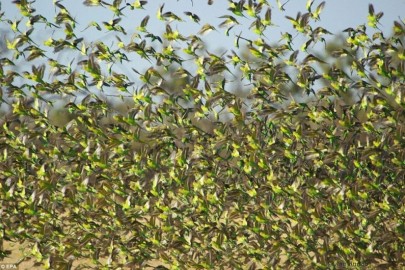
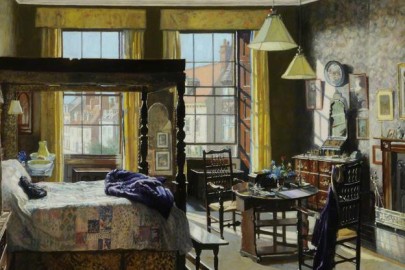







I really like these James McIntosh Patrick pictures, although I’m not 100% sure why; I think it’s the combination of the very familiar landscape mode with something a bit foreign, almost exotic – the light, the architecture, and the shape of the land are all very un-English. Also, he’s doing some quite tricky things with the perspective, especially in that Stobo picture – we seem to be looking at the scene from several slightly different viewpoints at once.
Another fine painting by JMP, his Autumn, Kinnordy, inspires a long passage in one of my favourite books, Peter Davidson’s The Idea of North:
It shows the precise moment when the harvest is over and the fields are beginning to be turned by the horse plough … to show red earth beneath the stubble. The leaves have turned and mostly fallen, but as yet there is no snow on the distant hills. Two men with guns are walking up the steep field in the foreground. It is already afternoon and the sunlight is weakening … Evening will approach slowly, but soon.
What gives this painting its quality and its urgency is that it catches a moment of lastness. The last of the days when it is possible even to pretend that winter is not imminent. The last moment of the autumn afternoon before the chill strikes, the last moment of stillness before the evening wind rises … In retrospect, it is hard not read the painting as an image of loss: the last years before the war, the last years of farming with horses. How empty the air is in the last of the light. How cold it will be by the time that the men with guns have returned to the handsome farmhouse.
(If you haven’t come across this, I think it’s a book you might really like, Stephen.)
Mr Law: Thank you very much for your thoughts on the paintings. I stumbled across an image of “Stobo Kirk” four or five years ago, which began my interest in McIntosh Patrick. Unfortunately, I have never seen any of his paintings “in person” — only through the Internet. The BBC site “Your Paintings” contains images of 54 of his paintings, if you wish to see more. To my knowledge, the only book published on his work is a catalogue for a 1987 exhibition in Dundee.
I greatly appreciate your reference to the passage from Peter Davidson’s The Idea of North: “Autumn, Kinnordy” is one of my favorites. For similar panoramic seasonal paintings, have a look at “Springtime in Eskdale,” “The Etrick Shepherd,” and “Winter in Angus” at the BBC site. Lovely.
As it happens, I read a review of The Idea of North in the TLS when it was first published, and clipped the review, intending to purchase the book. I never got around to it, but your mentioning it reminded me that I need to read it. Thank you.